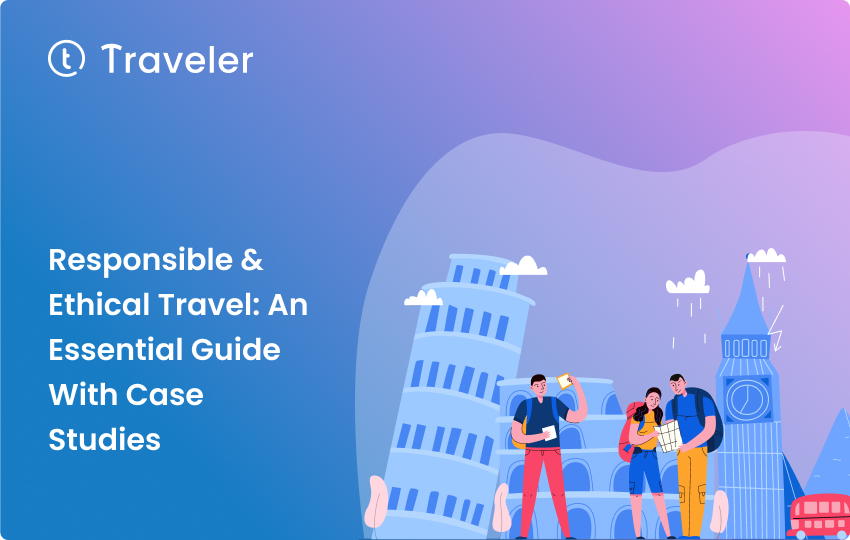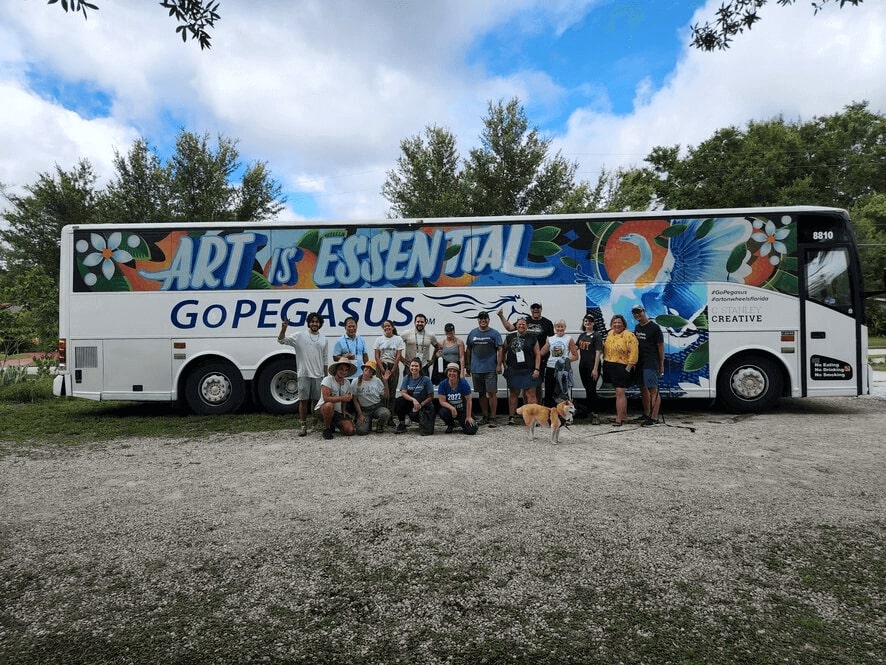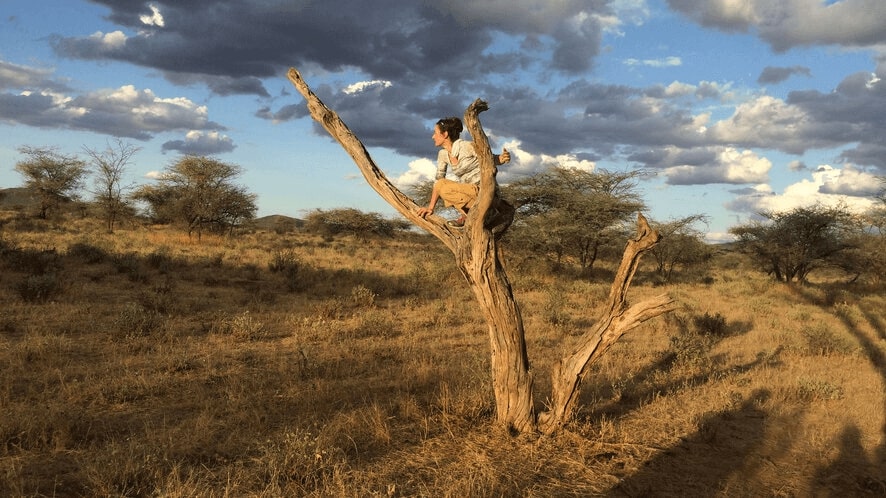
Table of Contents
Ethical travel (or responsible travel) means being aware of how traveling for fun affects the earth, animals, and people. It is important to know that we are just passing through and can have either a good or bad effect.
This kind of tourism should have as many positive social and environmental effects as possible and as few negative social or environmental effects as possible. This will help the locals keep important customs and habitats that are in danger of being lost.
Check out this informative essential guide to responsible and ethical travel. Our guide provides essential information on how to travel in a sustainable and responsible way, ensuring that you can explore the world without harming the planet. Perfect for those who want to make a positive impact while traveling.

Choosing ethical destinations
Responsible tourism means choosing socially, environmentally, and culturally respectful destinations. It means going beyond simply considering whether they’re cheap or expensive and ensuring their good places to visit and do business in.

Plenty of resources are available to help you ensure that your travels are ethical and responsible. You can start by checking out the United Nations’ Global Sustainable Tourism Council (GSTC) website, which has an entire section devoted to sustainable tourism. The site also has an interactive map to search for destinations based on their sustainable tourism practices.

G Adventures runs trips with small groups that are led by a guide. It has 28 sites in different parts of the world, and its main office is in Toronto, Ontario, Canada. It takes more than 200,000 people from 160 countries on more than 700 trips in more than 100 countries every year. G Adventures says it is more committed to community tourism now that it will add 25 more Planeterra projects to its trips by 2020. Planeterra is a charity that works with G Adventures. On 90% of the operator’s small-group tours, the group will visit a community tourism project that helps women and children, Indigenous culture, or the environment. As a result, there are now 100 projects all over the world.
Minimizing environmental impact
The effect of tourism on the earth is a complicated matter. On the one hand, people who don’t take care of what they do can do a lot of damage. On the other hand, responsible tourism can be a force for good by teaching tourists and helping local communities gain from tourism.
Here are some ways to make less of an effect on the environment:
- Try to buy things that were made in the area and help the local economy by shopping at markets and shops near your hotel or hostel. If there is something you need to bring, buy a lot of it before you leave.
- Use public transportation when you can, and if it’s safe to do so, walk.
- Whenever you can, buy food from a local farmer’s market. This helps local businesses and reduces pollution caused by shipping food long distances across oceans or continents (which also happens when supermarkets sell imported fruits and veggies).

Ecotourism company Wilderness Safaris has its main office in Gaborone, Botswana. It runs camps and mobile safaris in six nations—Botswana, Kenya, Namibia, Rwanda, Zambia, and Zimbabwe. There is so much more to Wilderness Safaris than just a place to camp, trek, or fish. Our water and air are purified by wilderness. It serves as a habitat for wildlife and a source of income for nearby towns.
Supporting local communities
One of the most important ways to be ethical and responsible when traveling abroad is to help the places you visit. When you spend money at local businesses or hang out with locals, they directly gain from your visit. This goes beyond just having a good time together.
Here are some tips that will help you be a good traveler:
- Stay in places that are owned by people in the area or hotels that have good relationships with the community.
- Eat at cafes and restaurants that are run by people from the area so you can meet more people.
- Support local businesses by shopping at local shops and markets instead of tourist shops.
Tourism Care is a non-profit group that works to make sure the travel and tourism industry will be around for a long time.

Tourism Cares awarded a grant to the “Moshi Mamas” program, a craft cooperative developed by graduates of the nonprofit Give a Heart to Africa, following a Kilimanjaro climb fundraising campaign led by Board Member Arnie Weissmann. Tourists who come to buy handmade jewelry, clothes, bags, household items, and arts and crafts provide income for the women.
Respecting local cultures
The most crucial thing regarding responsible travel is respecting local cultures. It would be best if you never tried to change how people live because it only causes problems for everyone involved. This means that you shouldn’t force your beliefs or lifestyle onto locals just because you feel like you need to do it. If you respect their culture and way of life, they will also respect yours.
Here are some tips for respecting local cultures:
- Respect local customs: ask before getting too close to people or taking photos. If you’re going to be spending time around children, make sure that you don’t touch them without their parents’ permission.
- Be respectful about religion: avoid criticizing others’ religious beliefs at all costs; seek common ground instead.
- Learn some basic phrases before you go: this can help break the ice with locals who might otherwise be unsure about what exactly is going on when they see a bunch of

Intrepid Travel is a company that plans adventure trips for small groups. The company offers more than 1,100 guided tours all over the world. On average, there are 10 people on each tour.
Their goal is to help people and the environment have the best vacation experiences ever by leading, inspiring, creating, and sharing them. Because of this, they have been carbon-neutral since 2010, have offset all of our trip emissions, and have a seven-point commitment plan to back up their claim of a climate emergency.
Choosing responsible and ethical tour operators
Responsible tourism methods include:
- Conservation: helping local people take care of their environment and natural resources
- Paying workers fairly for their work, including tips and commissions paid by tour operators or hotels.
- Working with local communities to make sure they benefit from tourism activities is what we call “local involvement.”
- Education in tourism means teaching tourists about the local culture, history, and nature through things like volunteering or community projects.
There are many things to think about before you book your next trip: Where do they live and work? Are they owned by people in the area or by people from other countries? What do people say about them? How do they treat their employees and the people who live near them? Are they honest about how they affect the environment? …, etc.
- Look for tour companies in your area that have good reviews.
- Check to see if your hotel can suggest any trips or other things to do in the area.
- Do some study online, but keep in mind that many online review sites aren’t reliable because anyone can post a review, whether it’s true or not.
P/S: TravelerWP is a Travel Agency WordPress Theme designed for responsible and ethical tour operators who prioritize sustainable tourism. With its clean and modern design, TravelerWP offers a user-friendly platform for tour operators to showcase their responsible travel packages and promote their eco-friendly initiatives. This theme is perfect for those who aim to create a positive impact on the environment and local communities while providing unique and authentic travel experiences for their clients.

Elevate Destinations was started and is run as a social enterprise. This means that the company’s goal is to give back to the community and take care of the environment. When you add this to their strong belief that family travel that digs deep into local culture can answer kids’ questions about the world, you have a winning combo. Elevate Destinations helps people of all ages “experience, understand, and protect” the places they visit through custom family trips.
Conclusion
While ethical and responsible tourism can seem complicated, it’s not as complicated as you might think. By heeding the advice by choosing responsible and ethical destinations and tour operators, minimizing environmental impact, supporting local communities, and respecting local cultures, you will be well on your way to enjoying a much more authentic local experience while supporting local communities at the same time. In turn, you’ll have an unforgettable travel experience and memories that will last a lifetime.


